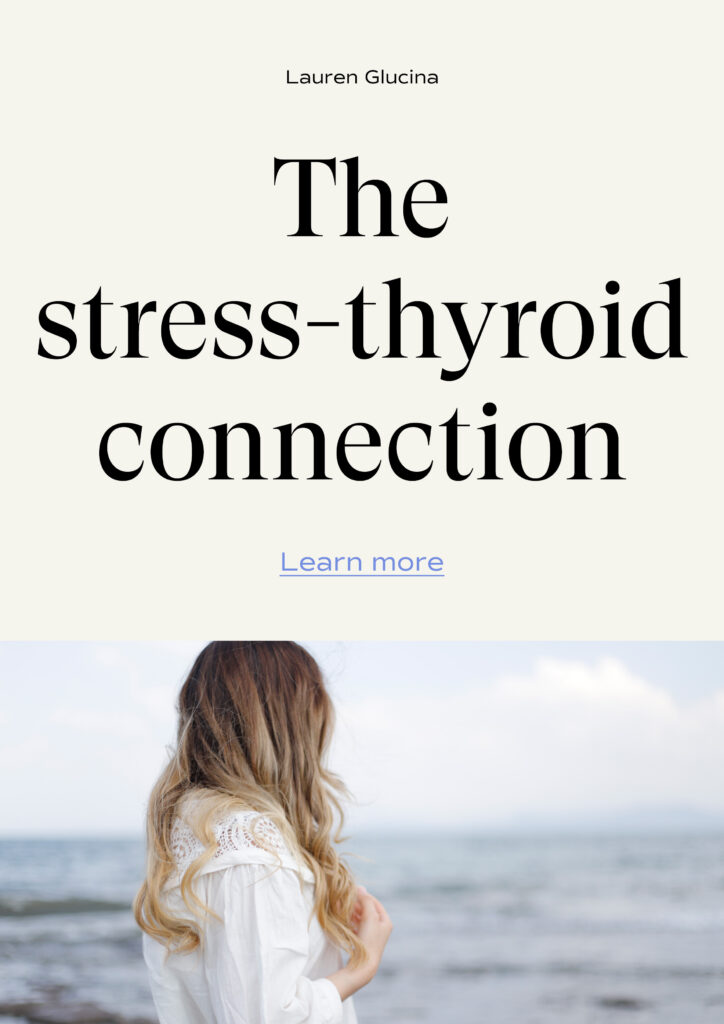In this article, we’ll explore how increased stress can suppress thyroid function and what that means for your health.

The hypothalamic-pituitary-adrenal (HPA) axis is a vital system that helps the body respond to and adapt to various stressors by boosting the production of stress hormones like glucocorticoids (such as cortisol) and adrenal androgens (such as DHEA).
However, it is equally important to inhibit this system when necessary to prevent the negative effects of prolonged exposure to these stress hormones on the brain, endocrine, and immune systems.
Here, we’ll look at how chronic stress affects thyroid function, including the role of inflammation that often accompanies it.
⬇️ Suppresses TSH, T4
Elevated cortisol levels disrupt the hypothalamic-thyroid-pituitary axis. When this occurs, thyroid-stimulating hormone (TSH) secretion is suppressed, reducing levels of thyroxine (T4) [Source].
🦋 TSH is the ‘whip’ cracked by the pituitary gland, commanding the thyroid gland to make thyroid hormones. With less whipping, there is naturally less thyroid hormone production.
Both endogenous cortisol (produced by the body) and exogenous corticosteroids (medications – such as prednisone) can have this effect.
🛑 Impairs conversion of T4 into T3
Thyroxine (T4) is an inactive form of thyroid hormone that must be converted into triiodothyronine (T3), the active form that the body can use.
The conversion of T4 to T3 occurs primarily in the liver and gut, mediated by enzymes called deiodinases.
There are three types of deiodinases:
- Type 1 (D1) and Type 2 (D2) convert T4 into active T3
- Type 3 (D3) converts T4 into reverse T3 (rT3), an inactive form of T3 that doesn’t perform the same functions
Under stress, elevated cortisol levels and circulating inflammatory cytokines suppress the activity of D1 and D2, while increasing the activity of D3. This shift reduces the amount of active T3 available to tissues, slowing down metabolism [Source, Source, Source].
🚫 Blocks cellular uptake of T3
Chronic stress and inflammation can impair the function of thyroid receptors on cells, as well as the transport proteins that carry thyroid hormones into cells.
The net effect is reduced uptake of thyroid hormones, a condition known as cellular hypothyroidism.
This may lead to significant symptoms of hypothyroidism, even when thyroid pathology appears normal.
♀️ Impairs oestrogen clearance, increases thyroid binding globulin
Chronic stress and elevated cortisol levels can suppress the hypothalamic-pituitary-ovarian (HPO) axis, similar to their effect on the hypothalamic-pituitary-thyroid (HPT) axis.
This suppression can result in a relative deficiency of progesterone compared to oestrogen, partly due to impaired oestrogen clearance in the liver.
This has a knock-on effect on thyroid health, as excess oestrogen can increase levels of thyroid-binding globulin (TBG), a protein that binds to thyroid hormones during transport in the body [Source].
When thyroid hormones are bound to TBG, they become inactive; they must dissociate into their ‘free’ forms to bind to and activate thyroid receptors.
In lab tests, this may present as low free T4 and low free T3 levels.
🦠 Breaks down gut barriers, promotes autoimmunity
Chronic stress can damage the gut barrier, resulting in increased intestinal permeability, commonly referred to as ‘leaky gut.’ When this occurs, larger proteins and other antigens can enter the bloodstream or even the brain, where they shouldn’t be.
This can eventually provoke an immune and inflammatory response, making us more susceptible to autoimmune diseases, such as Hashimoto’s [Source].
To conclude, all of the above can contribute to an under-active thyroid, which can present with the following symptoms –
- Fatigue
- Weight gain
- Cold intolerance
- Dry skin
- Hair loss or thinning
- Muscle weakness
- Depression or mood changes
- Constipation
🦋 To heal the thyroid, you need to heal the adrenals
Addressing your stress and normalising adrenal hormone output is necessary to heal the thyroid.
This encompasses addressing psychological stress, and physical stressors – such as nutrient deficiencies, environmental toxins, inflammatory foods, and gut-derived inflammation.
In terms of assessment, you will want to get a thorough thyroid hormone workup (see here for what that entails – don’t settle for just a TSH result!), a first-morning blood cortisol, DHEAs, and potentially even a salivary cortisol/DHEAs profile to chart your diurnal pattern.
With this information, you can make informed decisions regarding your treatment.
If you need support in this area, feel free to book in a consultation with me here, and keep an eye out for my upcoming programme, Breaking Burnout – the ultimate solution to sustained energy, emotional resilience, mental clarity, and body-confidence, empowering you thrive like never before in business and in life again.
Till next time,
Lauren







Comments +